
Local Traditions & Customs in Lagos, Lagos, Nigeria
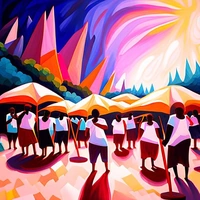
1. Eyo Festival
A vibrant celebration unique to Lagos, the Eyo Festival fills the streets with costumed dancers known as the 'Eyo' who wear white robes and masks. It is believed to usher in spiritual cleansing and bless the land. The festival showcases the rich culture of the Yoruba people.
- Timing: Occurs only when declared by the Lagos King, often unpredictable.
- Dress Code: White attire is encouraged for cultural involvement.
- Crowd Size: Expect large gatherings, so plan your visit early.
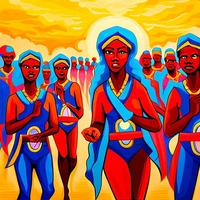
2. Lagos Carnival
Known as the ‘Fanti’ Carnival, this event is marked by colorful parades, dance, and music, reflecting Lagos's Brazilian connections. It is a deeply cultural event allowing travellers to engage with the vibrant spirit of the city. The carnival promotes unity among different cultural backgrounds in Lagos.
- Date: Usually around Easter, check local calendars.
- Participation: Open to all, great for fully experiencing local culture.
- Accessibility: Often held in central Lagos areas, easy access expected.
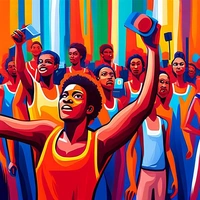
3. Ayo Game
A traditional Yoruba board game played by young and old, it's a significant social activity in Lagos. It encourages social interaction and strategic thinking. Playing this game connects you with the local way of relaxing and bonding.
- Skill Level: Simple to learn, enjoyable for all ages.
- Social Aspect: A great way to connect with locals.
- Availability: Boards often found in markets for purchase as souvenirs.
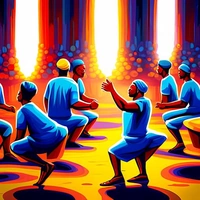
4. Yoruba Drum Circles
Witness or join the traditional Yoruba drum circles that are prevalent in Lagos. These drumming sessions are often spontaneous and reflect community storytelling and celebration. It's a perfect way to immerse in the rhythmic heartbeat of Lagos.
- Location: Usually in local neighborhoods.
- Participation: Often open for bystanders to join.
- Volume: Can be quite loud, typical of local gatherings.

5. New Yam Festival
Celebrated by the Igbo community within Lagos, this festival marks the beginning of the harvest season. It involves offerings, cultural dances, and a feast centered around yam dishes. It provides insights into local agriculture and gratitude practices.
- Cultural Significance: Strongly tied to Igbo traditions.
- Seasonal: Held in August, marking the harvest time.
- Food: A chance to taste a variety of yam dishes.

6. Okada (Motorbike) Taxis
While not a festival, riding an Okada is a customary way to experience Lagos like a local. These motorbike taxis are ideal for navigating through the bustling traffic. It shows the practical, everyday life of Lagosians.
- Safety: Helmets are important; ask for one.
- Negotiation: Prices should be agreed on before the ride.
- Traffic: Ideal for quick navigation, be prepared for swift maneuvers.
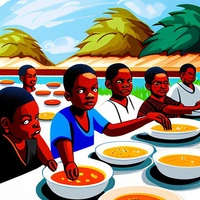
7. Sunday Soup Tradition
Sundays in Lagos often involve a large family gathering over traditional soups like Efo Riro or Egusi. It paints a picture of family unity and hospitality. Enjoying such a meal offers deep cultural engagement.
- Opening Hours: Mid-afternoon is typical meal time.
- Portion Size: Meals are often large, meant to be shared.
- Ingredients: Expect rich, spicy flavors.

8. Lagos Fashion Showcases
Fashion shows in Lagos highlight traditional attire blending with modern styles. Reflective of the city’s dynamic culture and innovation, these events are windows into the evolving Nigerian fashion scene. They celebrate local talent and craftsmanship.
- Tickets: May need advance purchase.
- Dress Code: Smart casual; sometimes culturally themed.
- Venue: Often hosted in chic hotels or event centers.

9. Cultural Heritage Sites Walks
Guided walks through historic sites like Freedom Park take you on a journey into Lagos's past. They cover colonial history and the evolution of local governance. A great way to understand Lagos’s blend of history and modernity.
- Tour Guides: Helpful for in-depth understanding.
- Duration: Can vary from 1-3 hours.
- Admission: Nominal fees may apply for entry.
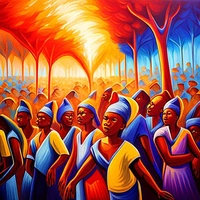
10. Ogun Festival
Honoring the god of iron and war, this festival is significant among certain communities in Lagos. It features rituals and celebrations seeking protection and strength. Participating in this festival views local belief systems up-close.
- Traditional Dress: Brown attire is often worn.
- Offerings: Animals or libations are commonly seen.
- Respect: Important to understand and respect rituals.

11. Public Beach Bonfires
A common local activity, bonfires bring people together for music, dance, and storytelling at beaches like Tarkwa Bay. It’s a relaxed way to end a day in Lagos, sharing stories with locals. Experience the nightlife with sand underfoot and stars above.
- Timing: Best experienced at sunset.
- Safety: Stay within known areas for safety.
- Booking: Some require arranging via local groups or services.
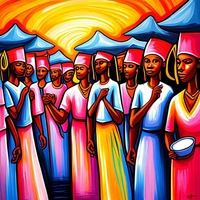
12. Egungun Festival
In this Yoruba festival, masked dancers represent ancestral spirits, involving street processions and ritual performances. It’s focused on honoring ancestors. Observing Egungun allows travelers to witness the spiritual facets of Yoruba culture.
- Photography: Be respectful, some areas may restrict it.
- Timing: Varies, check local announcements.
- Etiquette: Watching from a respectful distance is advised.

13. Traditional Naming Ceremonies
Attending a Yoruba naming ceremony can offer a glimpse into the cultural significance of personal names. Rich with songs and prayers, it reflects community blessings for the child’s future. Participation fosters understanding of local familial bonds.
- Invitation: Typically requires a local invite.
- Gifts: Small presents for the family are customary.
- Ceremony Length: Usually lasts about an hour.
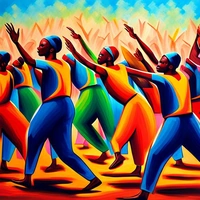
14. Bata Dance Performances
Originating within the Yoruba communities, Bata dance is recognized for its swift footwork and emphatic rhythm. It's often performed during festivals or special occasions, showing the dynamic energy of Lagos culture. Watching this dance is a high-energy cultural connection.
- Venue: Often seen at cultural centers or festivals.
- Participation: Observers encouraged to join in.
- Timing: Performance length can vary.

15. Kalakuta Museum
Explore the home of afrobeat legend Fela Kuti, where his life and the music genre he revolutionized are showcased. It's a significant cultural site, preserving Africa’s diverse musical heritage. Understand Lagos's role in global music through this museum.
- Admission: Entry fee is required.
- Guides: Tours provided for historical context.
- Photography: Allowed with respect to exhibits.

16. Lagos Street Food Tours
Embark on a guided culinary exploration of local street food like Suya or Puff-Puff. These tours are sensory adventures highlighting Lagos’s rich flavors and food culture. Sampling street food offers a delicious perspective on everyday local life.
- Health: Choose busy stalls for freshness.
- Wallet Friendliness: Generally affordable prices.
- Guide: Helpful for safe, insightful choices.
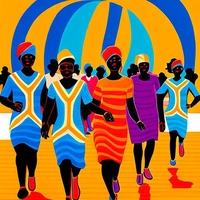
17. Owambe Parties
Large, extravagant parties common for weddings or birthdays, where you can experience music, dance, and food in a vibrant setting. It's a display of Lagos’s flamboyant and social aspects. Participation is a fun way to mingle with locals.
- Invitation: Typically hosted by friends/acquaintances.
- Dress Code: Expect to dress in bright, festive wear.
- Gift Giving: Presents for the host are appreciated.
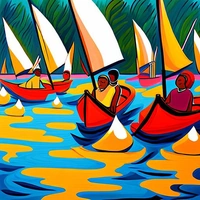
18. Fanti Regattas
Boat races featuring elaborately decorated boats reflecting the local marine culture. These races emphasize community pride and connection to the water. It's a visually striking tradition embodying the spirit of competition and celebration.
- Viewing Spots: Popular along waterfronts and piers.
- Scheduling: Often during festivals, check listings.
- Engagement: Opportunity to meet local fishermen.
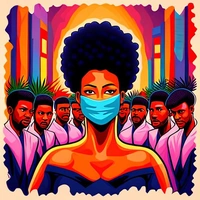
19. Afrobeat Live Shows
Enjoy live Afrobeat music sessions in local clubs or bars, showcasing both legendary hits and emerging talents. These performances are infused with social and political commentary. It connects travelers to the vibrant musical pulse of Lagos.
- Location: Notable venues include Shrine Lagos.
- Timing: Evening shows are most common.
- Entrance Fee: Usually required, varies by venue.
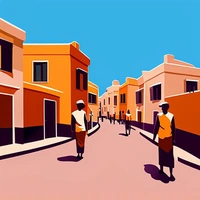
20. Craftsmen Village Excursions
Visit clusters like Lekki Market to explore traditional crafts from beadwork to wood carvings. These excursions support local artisans and preserve traditional methods. Observing artisans at work provides cultural insight beyond common tourist paths.
- Purchases: Prices are typically negotiable.
- Handmade Goods: Ensure authenticity by talking to craftsmen.
- Support: Buying supports local communities directly.
